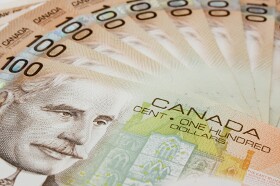The Canadian dollar is sliding before the Labor Day long weekend as global trade concerns and disappointing gross domestic product (GDP) figures are weighing on the loonie. It will be difficult for the Canadian dollar to find direction until a trilateral trade deal with the US and Mexico is either completed or rejected.
On Thursday, Statistics Canada reported the economy grew at a 2.9% annualized rate in the second quarter, which is slower than the initial 3% market forecast. The federal statistics agency further reported that the June GDP showed zero growth, disappointing markets after they projected a 0.1% increase. The Canadian GDP rose 0.5% in May. The lackluster growth may now cause the Bank of Canada (BOC) to delay its next rate hike after strongly hinting that it may raise interest rates in September.
Foreign Affairs Minister Chrystia Freeland told reporters on Friday that both sides are ânot there yetâ on reaching a new North American Free Trade Agreement (NAFTA) after failing to meet a Friday deadline.
We’re looking for a good deal, not just any deal. We will only agree to a deal that is a good deal for Canada. We’re not there yet.
The Office of the United States Trade Representative echoed Freelandâs comments, confirming in a statement that talks are âongoingâ and âthere have been no concessions by Canada on agriculture.â
Also, White House deputy press secretary Lindsay Walters said both sides want to reach âa win-win deal that benefits both countries.â
The Toronto Star reported that President Donald Trump said privately that he would never make a compromise in trade negotiations with Canada. The president also told Bloomberg News that he wanted to be off the record because he would not want to state his positions publicly since âitâs going to be so insulting theyâre not going to be able to make a deal.â
American and Canadian negotiators have entered into a critical phase of the deliberations after US and Mexico announced a new bilateral deal on Monday. The pressure appears to be on Canada because it sends about 75% of its exports south of the border.
The loonie took another hit after a Federal Court of Appeal overturned approval of the $9.3 billion Trans Mountain oil pipeline expansion, leaving the project, which would triple capacity from Alberta to British Columbia, in limbo. This is a huge blow to the Canadian economy because it could impact domestic output, especially as bottlenecks continue to amplify. It could also serve as a blow to Prime Minister Justin Trudeau who bet that he could appease everybody: the oil industry, Aboriginal people, and environmentalists.
The USD/CAD currency pair surged 0.67% to 1.3071, from an opening of 1.3071, at 16:47 GMT on Friday. The EUR/CAD rose 0.03% to 1.5153.
If you have any questions, comments or opinions regarding the Canadian Dollar,
feel free to post them using the commentary form below.
